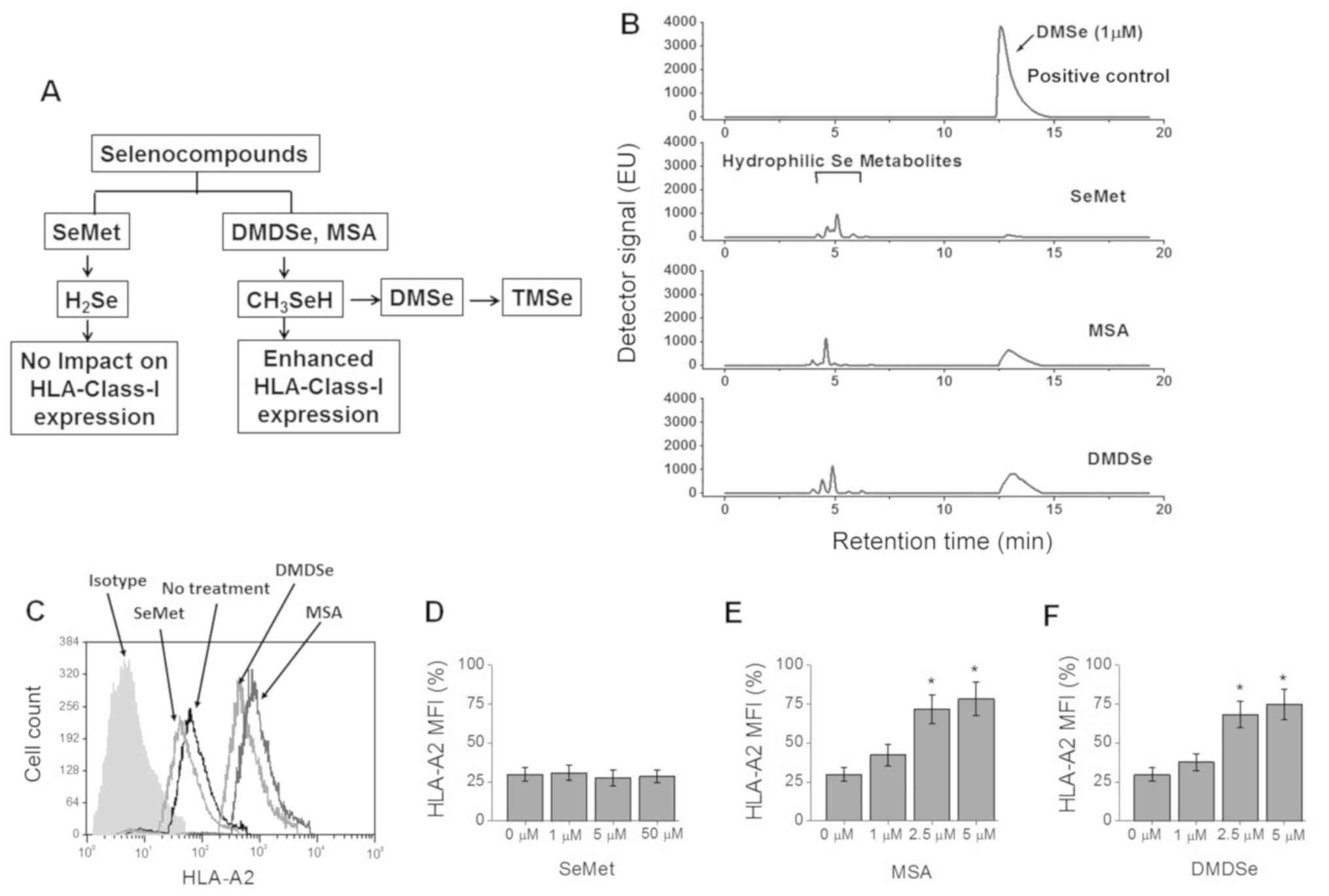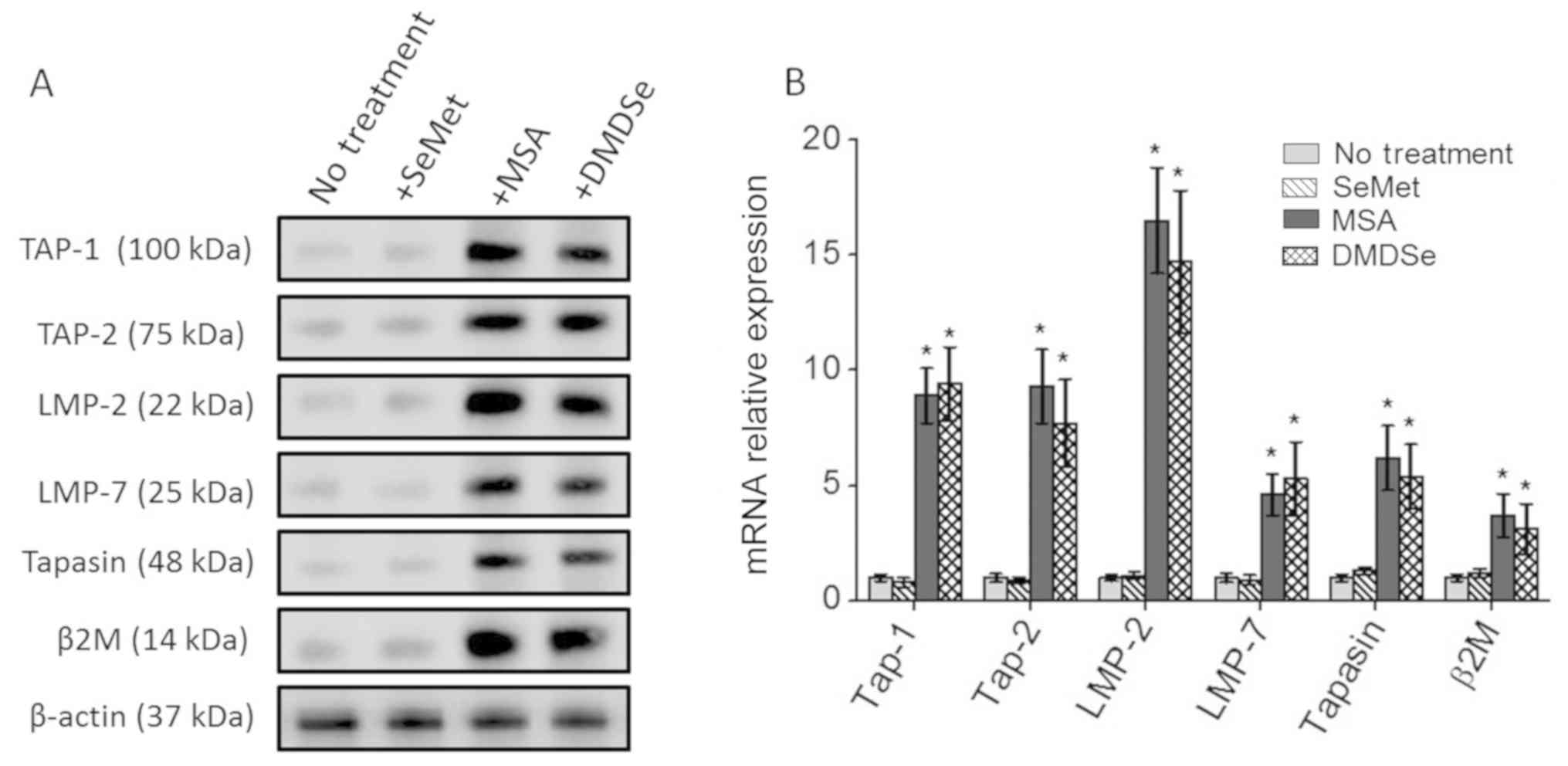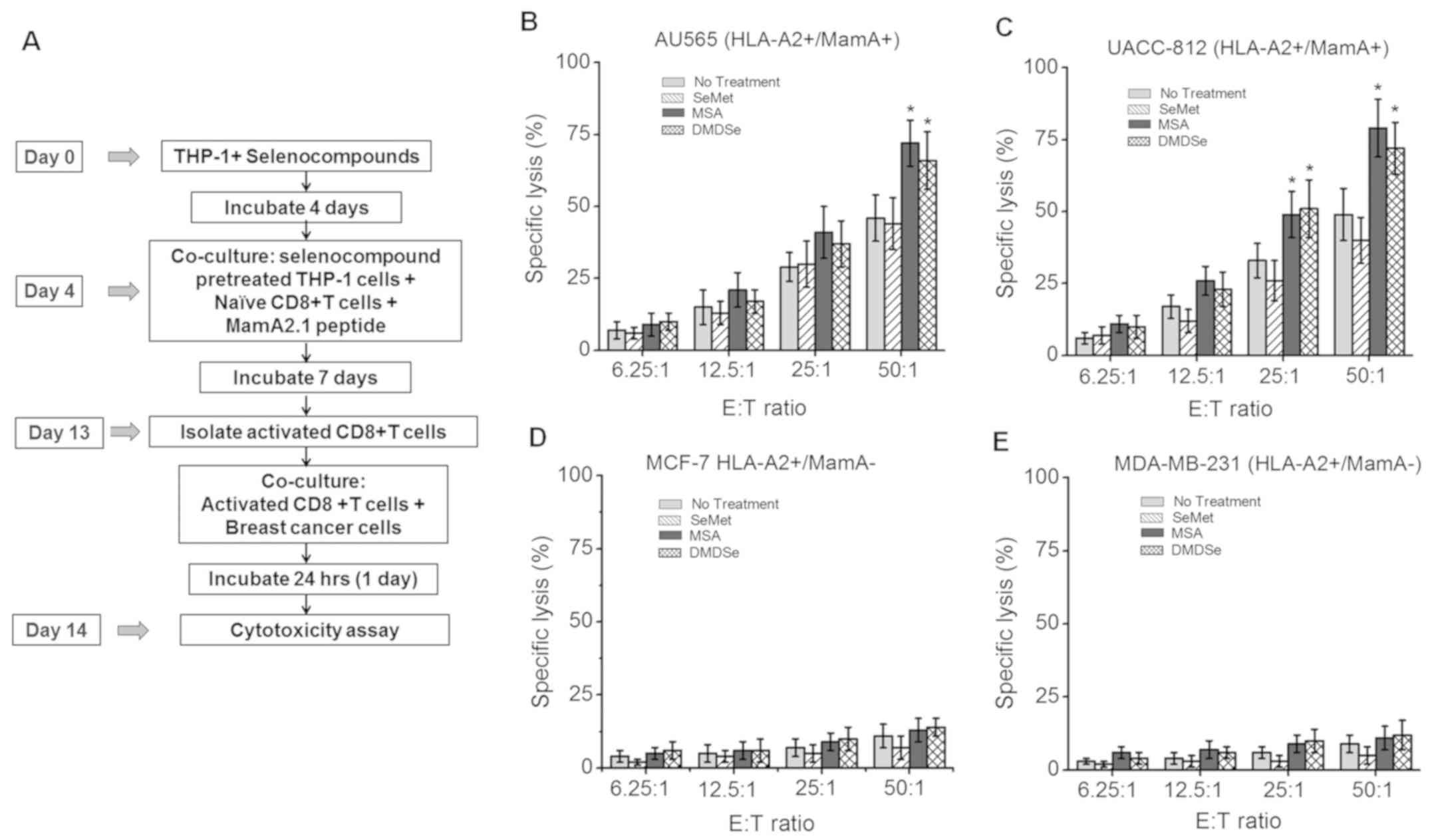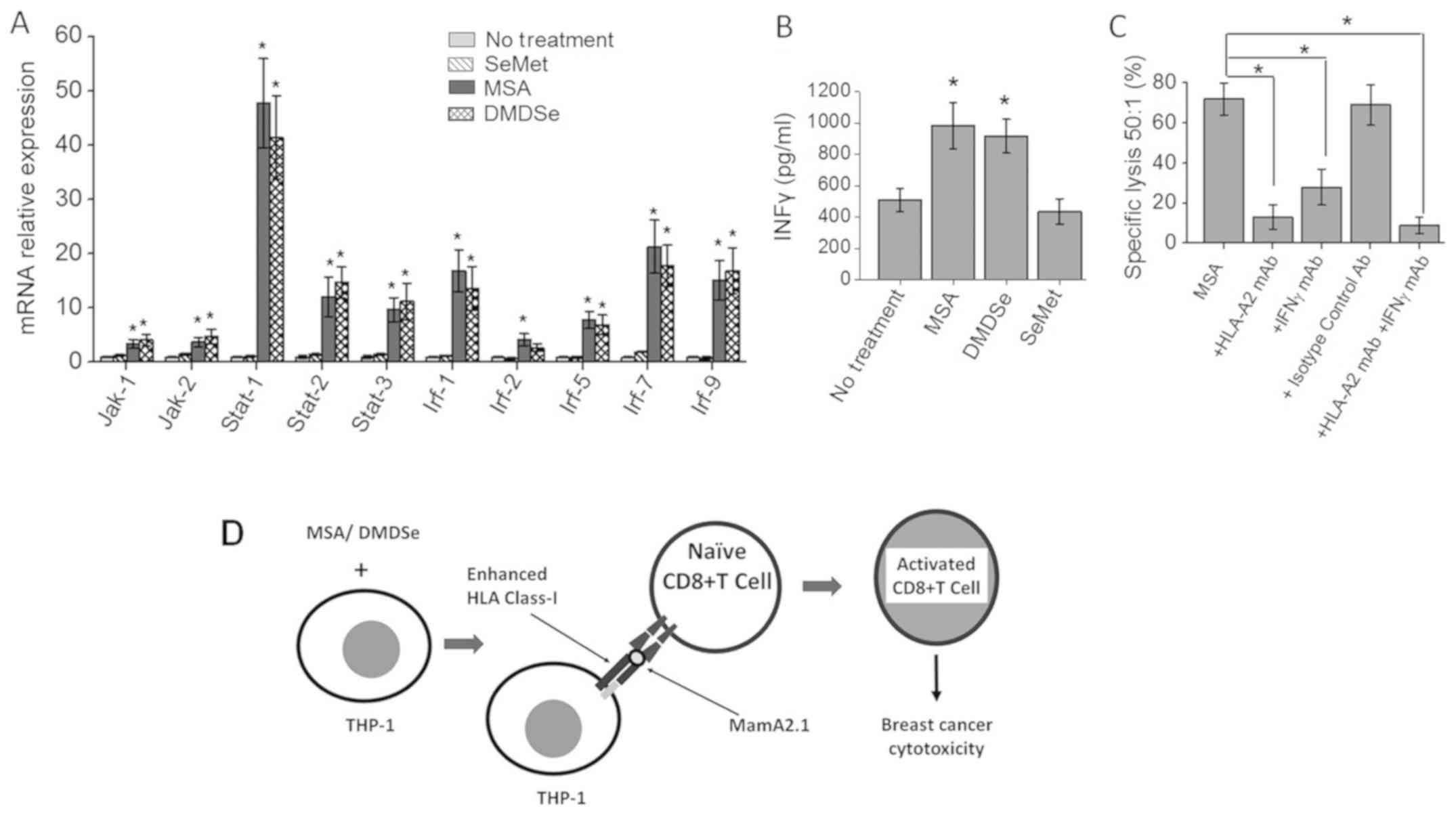|
1
|
Beatty GL and Gladney WL: Immune escape
mechanisms as a guide for cancer immunotherapy. Clin Cancer Res.
21:687–692. 2015. View Article : Google Scholar : PubMed/NCBI
|
|
2
|
Schreiber RD, Old LJ and Smyth MJ: Cancer
immunoediting: Integrating immunity's roles in cancer suppression
and promotion. Science. 331:1565–1570. 2011. View Article : Google Scholar : PubMed/NCBI
|
|
3
|
Kaneko K, Ishigami S, Kijima Y, Funasako
Y, Hirata M, Okumura H, Shinchi H, Koriyama C, Ueno S, Yoshinaka H
and Natsugoe S: Clinical implication of HLA class I expression in
breast cancer. BMC Cancer. 11:4542011. View Article : Google Scholar : PubMed/NCBI
|
|
4
|
Zeng H and Combs GF Jr: Selenium as an
anticancer nutrient: Roles in cell proliferation and tumor cell
invasion. J Nutr Biochem. 19:1–7. 2008. View Article : Google Scholar : PubMed/NCBI
|
|
5
|
Clark LC, Combs GF Jr, Turnbull BW, Slate
EH, Chalker DK, Chow J, Davis LS, Glover RA, Graham GF, Gross EG,
et al: Effects of selenium supplementation for cancer prevention in
patients with carcinoma of the skin. A randomized controlled trial.
Nutritional Prevention of Cancer Study Group. JAMA. 276:1957–1963.
1996. View Article : Google Scholar : PubMed/NCBI
|
|
6
|
Ip C, Thompson HJ, Zhu Z and Ganther HE:
In vitro and in vivo studies of methylseleninic acid: Evidence that
a monomethylated selenium metabolite is critical for cancer
chemoprevention. Cancer Res. 60:2882–2886. 2000.PubMed/NCBI
|
|
7
|
Suzuki KT, Kurasaki K and Suzuki N:
Selenocysteine beta-lyase and methylselenol demethylase in the
metabolism of Se-methylated selenocompounds into selenide. Biochim
Biophys Acta. 1770:1053–1061. 2007. View Article : Google Scholar : PubMed/NCBI
|
|
8
|
Qi Y, Fu X, Xiong Z, Zhang H, Hill SM,
Rowan BG and Dong Y: Methylseleninic acid enhances paclitaxel
efficacy for the treatment of triple-negative breast cancer. PLoS
One. 7:e315392012. View Article : Google Scholar : PubMed/NCBI
|
|
9
|
Demaria M, Giorgi C, Lebiedzinska M,
Esposito G, D'Angeli L, Bartoli A, Gough DJ, Turkson J, Levy DE,
Watson CJ, et al: A STAT3-mediated metabolic switch is involved in
tumour transformation and STAT3 addiction. Aging (Albany NY).
2:823–842. 2010. View Article : Google Scholar : PubMed/NCBI
|
|
10
|
Mikhitarian K, Gillanders WE, Almeida JS,
Hebert Martin R, Varela JC, Metcalf JS, Cole DJ and Mitas M: An
innovative microarray strategy identities informative molecular
markers for the detection of micrometastatic breast cancer. Clin
Cancer Res. 11:3697–3704. 2005. View Article : Google Scholar : PubMed/NCBI
|
|
11
|
Fleming TP and Watson MA: Mammaglobin, a
breast-specific gene, and its utility as a marker for breast
cancer. Ann NY Acad Sci. 923:78–89. 2000. View Article : Google Scholar : PubMed/NCBI
|
|
12
|
Goedegebuure PS, Watson MA, Viehl CT and
Fleming TP: Mammaglobin-based strategies for treatment of breast
cancer. Curr Cancer Drug Targets. 4:531–542. 2004. View Article : Google Scholar : PubMed/NCBI
|
|
13
|
Gillanders WE, Mikhitarian K, Hebert R,
Mauldin PD, Palesch Y, Walters C, Urist MM, Mann GB, Doherty G,
Herrmann VM, et al: Molecular detection of micrometastatic breast
cancer in histopathology-negative axillary lymph nodes correlates
with traditional predictors of prognosis: An interim analysis of a
prospective multi-institutional cohort study. Ann Surg.
239:828–840. 2004. View Article : Google Scholar : PubMed/NCBI
|
|
14
|
Jaramillo A, Narayanan K, Campbell LG,
Benshoff ND, Lybarger L, Hansen TH, Fleming TP, Dietz JR and
Mohanakumar T: Recognition of HLA-A2-restricted
mammaglobin-A-derived epitopes by CD8+ cytotoxic T
lymphocytes from breast cancer patients. Breast Cancer Res Treat.
88:29–41. 2004. View Article : Google Scholar : PubMed/NCBI
|
|
15
|
Bharat A, Benshoff N, Fleming TP, Dietz
JR, Gillanders WE and Mohanakumar T: Characterization of the role
of CD8+ T cells in breast cancer immunity following
mammaglobin-A DNA vaccination using HLA-class-I tetramers. Breast
Cancer Res Treat. 110:453–463. 2008. View Article : Google Scholar : PubMed/NCBI
|
|
16
|
Tiriveedhi V, Tucker N, Herndon J, Li L,
Sturmoski M, Ellis M, Ma C, Naughton M, Lockhart AC, Gao F, et al:
Safety and preliminary evidence of biologic efficacy of a
mammaglobin-a DNA vaccine in patients with stable metastatic breast
cancer. Clin Cancer Res. 20:5964–5975. 2014. View Article : Google Scholar : PubMed/NCBI
|
|
17
|
Livak KJ and Schmittgen TD: Analysis of
relative gene expression data using real-time quantitative PCR and
the 2(-Delta Delta C(T)) method. Methods. 25:402–408. 2001.
View Article : Google Scholar : PubMed/NCBI
|
|
18
|
Cai Z, Dong L, Song C, Zhang Y, Zhu C,
Zhang Y, Ling Q, Hoffmann PR, Li J, Huang Z and Li W:
Methylseleninic acid provided at nutritional selenium levels
inhibits angiogenesis by down-regulating integrin beta3 signaling.
Sci Rep. 7:94452017. View Article : Google Scholar : PubMed/NCBI
|
|
19
|
Hagemann-Jensen M, Uhlenbrock F, Kehlet S,
Andresen L, Gabel-Jensen C, Ellgaard L, Gammelgaard B and Skov S:
The selenium metabolite methylselenol regulates the expression of
ligands that trigger immune activation through the lymphocyte
receptor NKG2D. J Biol Chem. 289:31576–31590. 2014. View Article : Google Scholar : PubMed/NCBI
|
|
20
|
Amara S and Tiriveedhi V: The five immune
forces impacting DNA-based cancer immunotherapeutic strategy. Int J
Mol Sci. 18:E6502017. View Article : Google Scholar : PubMed/NCBI
|
|
21
|
Slingluff CL Jr: The present and future of
peptide vaccines for cancer: Single or multiple, long or short,
alone or in combination? Cancer J. 17:343–350. 2011. View Article : Google Scholar : PubMed/NCBI
|
|
22
|
Tiriveedhi V, Fleming TP, Goedegebuure PS,
Naughton M, Ma C, Lockhart C, Gao F, Gillanders WE and Mohanakumar
T: Mammaglobin-A cDNA vaccination of breast cancer patients induces
antigen-specific cytotoxic CD4+ ICOShi T cells. Breast
Cancer Res Treat. 138:109–118. 2013. View Article : Google Scholar : PubMed/NCBI
|
|
23
|
Dunn GP, Old LJ and Schreiber RD: The
three Es of cancer immunoediting. Annu Rev Immunol. 22:329–360.
2004. View Article : Google Scholar : PubMed/NCBI
|
|
24
|
Matsunaga Y, Fukuma D, Hirata S, Fukushima
S, Haruta M, Ikeda T, Negishi I, Nishimura Y and Senju S:
Activation of antigen-specific cytotoxic T lymphocytes by beta
2-microglobulin or TAP1 gene disruption and the introduction of
recipient-matched MHC class I gene in allogeneic embryonic stem
cell-derived dendritic cells. J Immunol. 181:6635–6643. 2008.
View Article : Google Scholar : PubMed/NCBI
|
|
25
|
Buonaguro L, Petrizzo A, Tornesello ML and
Buonaguro FM: Translating tumor antigens into cancer vaccines. Clin
Vaccine Immunol. 18:23–34. 2011. View Article : Google Scholar : PubMed/NCBI
|
|
26
|
Bhat P, Leggatt G, Waterhouse N and Frazer
IH: Interferon-γ derived from cytotoxic lymphocytes directly
enhances their motility and cytotoxicity. Cell Death Dis.
8:e28362017. View Article : Google Scholar : PubMed/NCBI
|


















